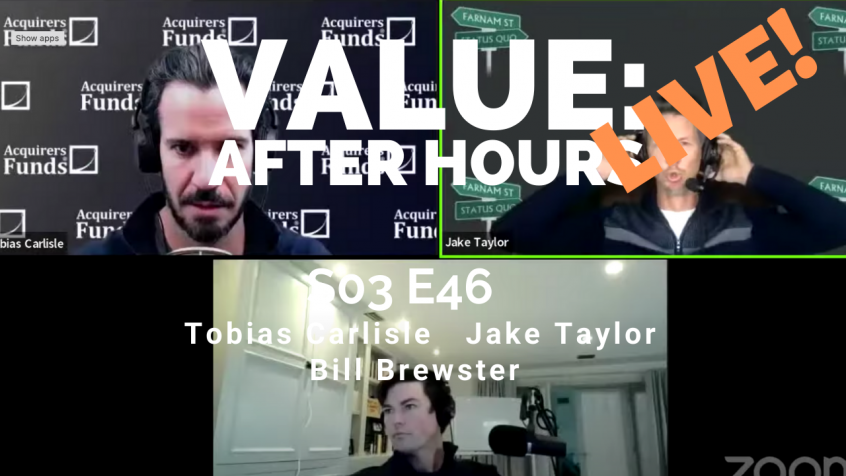In their recent episode of the VALUE: After Hours Podcast, Taylor, Brewster, and Carlisle discuss Buffett Needed AAPL To Keep Up With The S&P. Here’s an excerpt from the episode:
Tobias: One of the things that Alpha Architect has pointed out as Ryan Cohen’s work, I think, I mentioned this last week, but he says that, when he’s measuring it on EBIT total enterprise value, which is my acquirers multiple symmetric I like, the market is– the valley decile relative to the market has had a wider spread now than it was a year ago? On some different measures, there’s price to book, price to sales. But I think they track the price to cash flow and price to earnings as well. The spread now is wider than it was in 2000. That’s why value sucks so hard for so long. But it also means that the opportunity in value is pretty solid. Anybody want to dive on that grenade?
Jake: Wow. We’ve had this conversation already about– [crosstalk]
Tobias: We have this conversation every week. It’s my favorite topic.
Jake: Relative versus absolute. [laughs]
Bill: Well, I guess, with the absolute thing, I just don’t know why with all this money you’re ever going to– you don’t really deserve high absolute valuations in my opinion with this much money around. Because really all that money is doing is competing for an asset, then there’s a ton of money out there. So, why would absolute valuations be up there? With the amount of people that have gone into finance like, I don’t think setting your mind to historical absolute valuation makes a whole lot of sense.
Tobias: How are you calculating absolute valuation? Because I think it’s tough. Like you got to look at the 10-year, you got to look at other things. How do you think about it?
Bill: I just think you’d take what’s out there. You can sit there, and you can be the guy that shouts at the sky screaming about, “I need 10%,” but no one gives a shit what you need.
Tobias: I mean, Buffett’s been dying– To be fair, that’s literally his numbers isn’t–
Bill: Okay, but I do think and I’m going to–
Jake: Literally.
Bill: What I’m about to say, people are going to say like, “Okay, well, you just said that you eat all the pizza and you are fat. So, you’re fat or whatever.” Buffett needed Apple to keep up with the S&P. That is a big, big thing to ask of somebody all the time to recreate possibly the best investment of all time and have that be the strategy that you’re the guy that can shout at this guy, “I need this return and say, well, Buffett did it.” Well, Buffett, A, is way better than you, and B, he had like the best investment ever and required that to keep up. So, is that a good strategy for real or did it work out because he’s a genius?
Tobias: Yeah, I think, that he’s approaching the problem in a little bit different way. He’s not thinking, “How do I keep up with the S&P 500? He is thinking what big deployment of capital generates a sufficient return for me, regardless of what’s happening? He just takes them when he gets them.
Bill: I approach it like I am an idiot, and I have the market offering me things to buy, and what do I want to buy within what I can buy. You know what, if we all crash, I hope, I don’t lose relative wealth, because I don’t think paper wealth even means anything. Unless you’re trying to really have a step up in your purchasing power, which I’m really not. I’m trying to gain wealth over time.
Jake: Well, what happened to that jet, money talk?
Tobias: [laughs]
Bill: Well, I said for the right risk. I would risk it for a jet.
Jake: Okay.
Bill: But that risk isn’t out there right now.
Tobias: A good comment here from Bo Banks. He says, “Part of the reason EV/EBIT spread is greater is because the value bucket is much less levered than most times in history. Average net debt EBITDA multiple for the bucket is less than 40.
Bill: Nah, I don’t buy that.
Tobias: Yeah.
Bill: It’s not like these growthy entities are super levered.
Tobias: Yeah.
Bill: I don’t think you can say levered is the reason.
Tobias: I saw a chat yesterday that said that–
Corporate Debt Historic High
Jake: Corporate debt is at like historic high.
Bill: Okay, but I bet it doesn’t skew on growth. Everybody– All that people bitch about his stock-based compensation on growth. Growth, it probably has the most pristine balance sheet out there.
Tobias: That’s probably fair. I saw the chat yesterday, it said that, this is from some macro guy I’m sorry I missed the account when it came through, but it had the return on equity for the growth against the return on equity for value, and then the valuation multiples of the two and basically, they’ve tracked. So, they are better businesses.
Bill: Yeah. That makes more sense. A return on invested capital framework is what I think the answer to this problem is. Now, whether or not it mean reverts and whether or not it’s regulatory capture, those are different questions. But I do you think, these growthy businesses are pretty good businesses. At least the ones that have high multiples on average.
Tobias: Sure.
You can find out more about the VALUE: After Hours Podcast here – VALUE: After Hours Podcast. You can also listen to the podcast on your favorite podcast platforms here:
For all the latest news and podcasts, join our free newsletter here.
Don’t forget to check out our FREE Large Cap 1000 – Stock Screener, here at The Acquirer’s Multiple:



